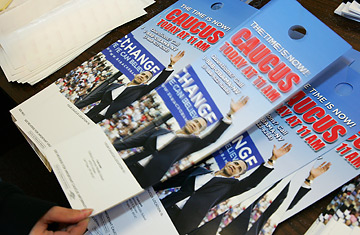
Workers sort through campaign material for Democratic presidential hopeful Barack Obama in preparation for the Nevada caucuses on January 19, 2008.
The Nevada caucuses. To many Washington wags, the very notion evokes images of show girls arguing with croupiers about the finer points of Hillary Clinton's healthcare policy and how, exactly, Barack Obama would engage in talks with Iran. And while that may well happen this Saturday, winning the state's Democratic caucuses has a lot more to do with courting the poor Hispanics that bus the hotel restaurants, the unions that represent them — and the other 1,754 caucuses across the state that will be nowhere near the Vegas strip.
Just as with the Iowa caucuses, organization is key in Nevada; the idea isn't just to finish first in the big population centers, as it is in primaries, but to win the rural areas as well since delegates are pre-apportioned across the state. But while all three top Democratic candidates spent months and tens of millions of dollars organizing Iowa, none have invested nearly the same time and resources in Nevada. Hillary Clinton, Barack Obama and John Edwards have each spent three weeks or less in state. And while Iowans have been trained by 32 years of caucusing, this is a new idea for most Nevadans. To further complicate things, the caucus is taking place at the worst possible time: on a Saturday afternoon, smack in the middle of a Holiday weekend — theoretically one of the busiest times for everyone from the croupiers to the busboys. Estimates for turnout range from 25,000 to 100,000. "It's going to be somewhat difficult for everybody, not just Hispanics who tend to work Saturdays,"said Fernando Romero, president of the non-partisan Hispanics in Politics, an activist group in Nevada that is not endorsing a candidate. "It's brand new and it's a hard concept to understand. You can't register early. You can't vote absentee. You can't vote any time all day. And that's what we're accustomed to here."
The Silver State's caucus wasn't supposed to turn out a joke. On the contrary, it scored what was originally intended to be a prime early slot on the political calendar, a nod to both the growing importance of Hispanics, who make up nearly a quarter of the state's population and the power of Senate Majority Leader Harry Reid, who hails from Nevada. It agreed to hold a caucus instead of a primary because state officials believed they it would come second in the nation after Iowa and before New Hampshire, which prizes its first-in-the-nation status. But after Michigan and Florida jumped their primaries ahead and forced Iowa and New Hampshire even earlier, Nevada now finds itself the fifth state that will pick presidential nominees. And because South Carolina is holding its crucial, bitterly contested Republican primary on the same day, the GOP caucus has become a mere afterthought (Mitt Romney is expected to win).
But Nevada could still get the last laugh. Because of the calendar contortions, Nevada's Democratic caucuses has gotten nearly 10 days of undivided press coverage. And with Clinton and Obama entering the contest with one win apiece in contested states, Nevada has suddenly become viewed as an important tiebreaker.
Which is perhaps why this past week has been marred with accusations of racism, complaints about external groups and a lawsuit over whether or not the nine Strip caucuses are even legal. The candidate that enters the contest with the biggest logistical advantage is Obama, who received the coveted Culinary Workers Union endorsement last week. The powerful group of 60,000-plus members could well swing the caucuses one way or another. They are so powerful that when Nevada was setting up the system a year ago they convinced the state to allow the nine special at-large caucuses on the Strip for workers who don't have time to return home for two hours in the middle of the day. Held in hotels just down the hall from over-oxygenated casinos, they are open to any workers within 2.5 miles: croupiers and show girls in addition to dishwashers, taxidrivers, bellboys and maids. So desirable was the endorsement that when Clinton lost it, a group of her allies immediately went to court to ask that the special caucuses be deemed illegal because they give an unfair advantage to unionized workers. A judge Thursday threw out the suit, and the caucuses will proceed as planned.
Clinton, who has a slight lead in the two most recent polls, has long been the frontrunner in Nevada. Last month she led Obama by 27 percentage points in an American Research Group survey, though she began losing ground after she placed third in Iowa, and now only leads Obama by 3 percentage points in the same poll. The former first lady and her husband, Bill Clinton, have spent much of the week campaigning in Nevada and have the backing of most Nevada Hispanic leaders, including the largest Spanish language paper, as well as much of the state's Democratic establishment, including 27 elected officials. She also has the backing of eight national unions, six of which have locals in Nevada."We've built a strong grass roots organization and we feel confident people will show up,"said Clark County Commissioner Rory Reid, Clinton's co-chair for Nevada and Harry Reid's son. "She's been endorsed by most of the community leaders in Nevada. We're positioned well so we'll see."
